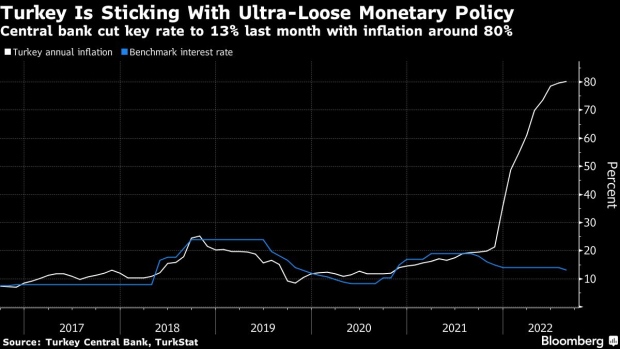Sep 21, 2022
Turkey Set on Ultra-Loose Course After Shock Rate Cut
, Bloomberg News

(Bloomberg) -- Turkey’s central bank delivered another shock cut to interest rates, despite inflation running at a 24-year high and with the lira trading at a record low.
The Monetary Policy Committee led by Governor Sahap Kavcioglu lowered the benchmark to 12% from 13% on Thursday, surprising most economists surveyed by Bloomberg. The lira extended declines after the announcement and was trading 0.2% weaker against the dollar as of 3:02 p.m. in Istanbul.
Turkey is charting an economic strategy in defiance of mainstream monetary policy. It’s already been an outlier for much of this year, as the world’s central bankers unleashed the most aggressive tightening in decades, and stood out even more this week as countries like Indonesia and Brazil raised rates.
Similarly to August, when Turkey’s central bank ended a seven-month pause with an unexpected 100 basis-point cut, it cited a “loss of momentum in economic activity” as rationale for its decision on Thursday.
In a statement accompanying its decision, the MPC hinted at its bias toward supporting the economy and suggested little worry over price stability. “Since the beginning of July, leading indicators have been pointing to a slowdown in growth due to weakening foreign demand,” it said.
President Recep Tayyip Erdogan and his ally Kavcioglu are sticking to an unorthodox playbook that resists rate hikes to contain inflation. The approach has encouraged economic growth at the expense of price stability and left Turkish assets more vulnerable to sell-offs.
In an interview with PBS NewsHour this week, Erdogan said “inflation is not a crippling economic threat.” Price growth in Turkey has shot past an annual 80%, while the lira is among this year’s worst performers in emerging markets.
What Bloomberg Economics Says...
“We expect the Turkish central bank to cut the rate further as it looks to boost growth in the lead up to next year’s general election. The bank will try to balance its easing with alternative tools -- focusing on guiding credit growth with an aim to curb inflation and prop up the lira.”
--Selva Bahar Baziki, economist. Click here for more.
Kavcioglu, in a blog post last week, repeated that macroprudential measures and policies aimed at widening the use of the lira will be used to achieve price stability. He’s the fourth central bank governor since 2019 after Erdogan fired three predecessors.
Given that the ruling party’s popularity is hovering at historic lows as the cost of living soars, the government is “very keen to underpin economic activity,” said Henrik Gullberg, macro strategist at Coex Partners Limited in London.
But he warned that such a policy, combined with fears of a global recession and spiraling inflation, is “a very bad mix” for the lira.
The central bank, which says it remains committed to its 5% inflation target, cut rates multiple times under Kavcioglu’s leadership late last year when annual price increases were already running in double digits.
“Rate cuts will follow for the rest of this year,” said Tugberk Citilci, head of research at InvestAZ Menkul Degerler A.S., who had predicted a 100 basis-point decrease. “The central bank delivered a rate cut against a slowdown at home and in the EU.”
(Updates with economist comments starting in ninth paragraph)
©2022 Bloomberg L.P.






